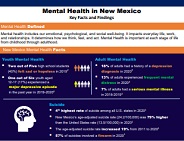Mental Health Program
Frequently Asked Questions
Why is mental health important?
According to the World Health Organization (WHO) there is “no health without mental health”. The Global Burden of Disease Study shows that mental disorders (like depression, schizophrenia, and bipolar disorder) make up the highest burden of disease both globally and in the US. Mental disorders are a concern for people of all ages (children to older adults) and are associated with age, gender, education, income level, race and ethnicity, geographical location and sexual orientation.
Mental disorders also have a serious impact on physical health and are associated with the prevalence, progression, and outcome of some of today's most pressing chronic diseases, including diabetes, heart disease, and cancer. They have long-lasting effects that not only include high psychosocial and economic costs for people living with the disorder, but also for their families, schools, workplaces, and communities.
Mental disorders increase the risk for both attempted suicide and suicide; approximately 90% of suicide victims have a diagnosable mental health condition, most commonly a mood or substance use disorder. In New Mexico, suicidal behaviors are a serious public health problem and a major cause of morbidity and mortality. In 2014, suicide was the eighth leading cause of all death in New Mexico; and the second leading cause of death for all age groups 10-39 years. Over the last 15 years, suicide death rates have increased slightly, with New Mexico’s rate being at least 50% higher than the national rate.
What is New Mexico doing to promote mental health?
The Department of Health conducts ongoing surveillance for indicators of mental health among students and adults in every county of New Mexico. Implementation of suicide prevention strategies statewide is a significant focus of the Department of Health’s Office of School and Adolescent Health. Youth suicide prevention and intervention activities were initially funded by the New Mexico Legislature in June 2005. The Human Services Department recently modernized the New Mexico Medicaid system by integrating physical and behavioral health services in the Centennial Care program, which will help treat an individual in a more holistic manner.
What can we do to improve mental health in New Mexico?

Mental illness can be treated and prevented. The Centers for Disease Control and Prevention have recommended several strategies for Improving Mental Health and Addressing Mental Illness to implement in the treatment setting and in legislation that promote recovery. The United States Preventive Services Task Force also recommends screening youth and adults for depression in the primary care setting when staff-assisted depression care supports are in place.
The Centers for Disease Control and Prevention, among many other organizations, want you to know that preventing suicide is possible when stakeholders work together. To see how, read the Surgeon General’s Suicide Prevention National Strategic Plan 2012 and visit the Centers for Disease Control and Prevention (CDC) Suicide Prevention Information and Resources page.
Mental Health Data

The State of Mental Health in New Mexico 2022 provides detailed information about mental health of New Mexico residents.
NMDOH also provides quarterly surveillance reports of emergency department visits involving a mental health or suicide related diagnosis:
- Mental Health Quarterly Surveillance Report (January 2024 to March 2024)
- Mental Health Quarterly Surveillance Report (October 2023 to December 2023)
- Mental Health Quarterly Surveillance Report (July 2023 to September 2023)
- Mental Health Quarterly Surveillance Report (April 2023 to June 2023)
- Mental Health Quarterly Surveillance Report (January 2023 to March 2023)
- Mental Health Quarterly Surveillance Report (October 2022 to December 2022)
- Mental Health Quarterly Surveillance Report (July 2022 to September 2022)
- Mental Health Quarterly Surveillance Report (April 2022 to June 2022)
- Mental Health Quarterly Surveillance Report (January 2022 to March 2022)
For more information about quarterly mental health surveillance, please see the Method and Background Document:
Other NMDOH Publications with Mental Health Data
These key publications will provide you with important information on mental health and suicide in New Mexico.
- New Mexico Child Fatality Review 2022 Report
- New Mexico Substance Use State Epidemiology Profile 2022 (August)
- Suicide Ideation and Attempts Among New Mexico Adults (2022)
- Mental Health Indicators and Inadequate Sleep Among New Mexico Youth, 2019
- ER Adverse Childhood Experiences Among New Mexico Adults Results from NM BRFSS 2019
- Trends in Suicide in New Mexico, 2009-2018
- State of Mental Health in New Mexico 2018
- Major Depression and Suicidal Ideation in New Mexico Adults
- Regional Variations in Hospitalization for Psychosis
- Mental Health Reports for New Mexico 2015
Fact Sheets
These fact sheets describe data and general info about a series of mental health topics.
Mental Health
- Mental Health Fact Sheet
- Mental Health Fact Sheet for Youth & Young Adults
- Mental Health Fact Sheet for Adverse Childhood Experiences
Suicide
Learn More
Visit the following resources to learn more about mental health and suicide.

